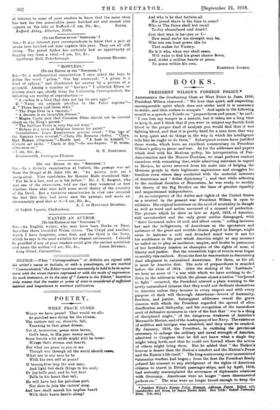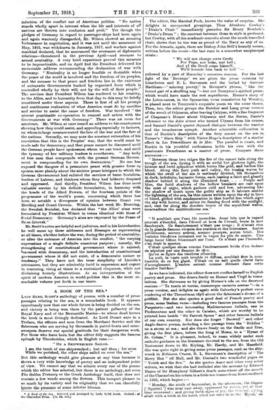BOOKS.
PRESIDENT WILSON'S FOREIGN POLICY..
ADDRESSING the Graduating Class at West Point in June, 1916, President Wilson observed : "We love that quiet, self-respecting, unconquerable spirit which does not strike until it is necessary to strike, and then strikes to conquer." And again in the following month in a speech at Toledo on "preparedness and peace," he said: "I can lose my temper in a minute, but it takes me a long time to keep it, and I think that if you were to subject my Scotch-Irish blood to the proper kind of analysis you would find that it was fighting blood, and that it is pretty hard for a man born that way to keep quiet and do things in the way in which his intelligence tells him he ought to do them." Subsequent events have justified these words, which form an excellent commentary on President Wilson's policyin peace and war. As for the addresses and papers which deal with his Mexican policy, his interpretation of Pan- Americanism and the Monroe Doctrine, we must perforce content ourselves with remarking that, while admitting mistakes in regard to Mexico, he never swerved from his main aim of helping the
• Mexican people in their legitimate aspirations and struggles for freedom even where they conflicted with the material interests of Americans and "dollar diplomacy"; and that while adhering to the cardinal doctrine of Monroeism, he was ready to modify the theory of the Big Brother on the lines of genuine equality and unquestioned independence.
As an interpreter of the duties and rights of the United States as a neutral in the present war President Wilson is open to oritioism. His original insistence on the need of neutrality in thought as well as word and action savoured of a counsel of perfection. The picture which he drew as late as April, 1915, of America, still unembroiled and the only great nation disengaged, with "three thousand miles of cool and silent ocean" rolling between her and the belligerents, of Americans as the spectators and audience of the great and terrible drama played in Europe, might seem to indicate a cold and detached mind were it not for his confidence in the part which America might at any moment be called on to play as mediator, umpire, and healer in pursuance of her hereditary mission as champion of the rights of man, of liberty and justice. But the irresistible logic of events soon began to modify this outlook. From the first he was resolute in denouncing dual allegiance in naturalized Americans. For them, as for all, it must be America first. The note of preparedness is sounded before the close of 1914. After the oinking of the • Lusitania we hear no more of "a war with which we have nothing to do." Even in the address in which the phrase about a nation "toolvoud to fight" occurred, the President uttered a plain warning to the newly naturalized citizens that they could not dedicate themselves to America unless they became in every respect and with every purpose of their will thorough Americans—lovers of humanity, freedom, and justice. Subsequent addresses reveal the grave concern with which the President regarded the spread of alien disaffection and disloyalty, and his recognition of the immediate need of defensive measures in view of the fact that "war is a thing of disciplined might," of the dangerous weakness of America's Mercantile Marine, and of the inadequacy of her Navy. The existence of sedition and intrigue was admitted, and they must be crushed, By January, 1916, the President, in outlining the provisions
necessary to enlarge the military and naval strength of Amerloa, admitted to Congress that he did not know what a single day might bring forth, and that he could not foretell where the action of others might bring them. But he added that ".the Nation's honour is dearer than the Nation's comfort and the Nation's Peace and the Nation's life itself." The long controversy over unrestricted submarine warfare had begun ; from the first, the President firmly refused his consent to any abridgment of the rights of American citizens to travel in British passenger-ships, and by April, 1916, had seriously contemplated the severance of diplomatic relations with Germany. Americans were no longer "mere disconnected jookers-on." The seas were no longer broad enough to keep the • President Wilson's Foreign Policy, Menages, Addresses, POPETI. Edited, situ Introduction and Notes, by Ames Brown Scat New York:Oxford University tress. (lea. net]
infection of the conflict out of American polities. "No nation stands wholly apart in interest when the life and interests of all nations are thrown into confusion and peril." Yet though the pledges of Germany in regard to passenger-ships had been spin and again wantonly disregarded, Mr. Wilson showed an amazing forbearance in negotiation, and it was not until the assurance of May, 1916, was withdrawn in January, 1917, and warfare against mankind declared, that he announced the severance of diplomatic relations—threatened in the previous April—and recourse to armed neutrality. A very brief experience proved this measure to be impracticable, and on April 2nd the President delivered his memorable address recommending the declaration of war with Germany. "Neutrality is no longer feasible or desirable when the peace of the world is involved and the freedom of its peoples, and the menace to that peace and freedom lies in the existence of autocratic Governments backed by organized force which is controlled wholly by their will, not by the will of their people." The services that President Wilson has rendered to his country, to the Allies, and to humanity from that day to this may be briefly considered under three aspects. There is first of all his prompt and continuous realization of what America must do by sacrifice and service to assist the cause of freedom. War involved "the utmost practicable co-operation in counsel and action with the Governments at war with Germany." There was no room for amateurs. Mr. Wilson at once issued an address to his countrymen showing how they could assist, and appealing especially to farmers, on whom In large measure rested the fate of the war and the fate of the nations. Secondly, we may note the constant reiteration of his conviction that this is the Peoples' war, that the world must be made safe for democracy, and that peace cannot be discussed until the German people have spokesmen whom we can trust, and until the tyranny of her military leaders is overthrown. "Any body of free men that compounds with the present German Govern- ment is compounding for its own destruotion." No one has exposed the dangers of a premature peace with greater force or' spoken more plainly about the sinister peace intrigues in which the German Government had enlisted the eervioes of tame Socialists, leaders of Labour, and thinkers whom they had hitherto despised and oppressed. And thirdly, President Wilson has done most valuable service by his definite formulation, in harmony with the heads of the Allied Powers, of the fourteen points of the programme of the world's peace, coneerning which there has been so notable a divergent* of opinion between Count von Hertling and Count Czernin. Within the last week Mr. Branting, the Swedish Socialist, has declared that "the Allies' aims were formulated by President Wilson in terms identical with those of Sacial Democracy. Germany's sinus are expressed by the Pease of Brast-Litovsk."
Mr. floott'a notes are helpful and judicious, and in his Introduction he well sums up these addresses and Messages as representing stall times, whether before the war, during the period of neutrality, or after the entrance of America into the conflict, "the varying expressions of a single definite conscious purpose ; namely, the strengthening of oonstitutionel government where it existed, leavened with dernooraoy, and the introduction of constitutional government where it did not exist, of a democratic nature or • tendency." They have not the terse simplicity of Lincoln's utterances, but they are admirably lucid in expression and cogent in reasoning, rising .at times to a restrained eloquence, while not disdaining homely illustrations. As an interpretation of the spirit of modern America in world-polities this is the most re. markable volume put forth in our times.



































 Previous page
Previous page